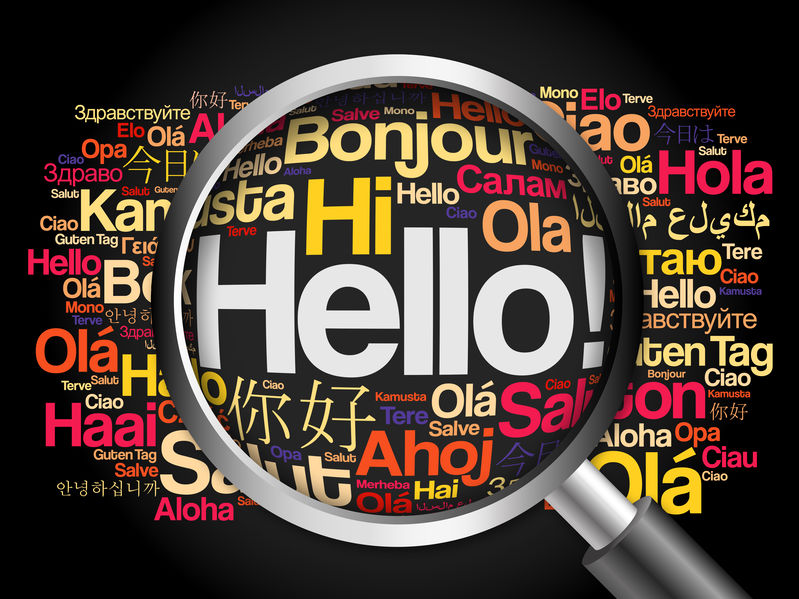Italian language, history, and facts
Introduction
Italian is a Romance language, and it mainly derives from Latin. The language is the member of an italic branch of the Indo-European language family. Italic is principally spoken in Italian peninsula, southern Switzerland, San Marino, Sicily, Corsica, northern Sardinia, and on the north-eastern coast of the Adriatic Sea, as well as in North and South America.
The first edition of an official Italian vocabulary published in 1612, by the Accademia della Crusca. The language slowly evolved from Latin into many dialects. At the end of the Middle Ages, the Tuscan dialect became the most popular version of Italian. Dante, Petrarca, and Boccaccio make the last impression on the Italian language. In the 19th century, when the peninsula united, Italian language became the official language of Italy.
History of Italian Language
The Italian language originates from "vulgar" Latin, mostly spoken among masses and illiterate or less educated citizen of ancient Rome. Many words spoken and written today are taken directly from the Latin language of 2,000 years ago (for example gloria, causa, poeta, memoria, medicina, simile).
The unification of Italy in 1961 had a profound effect not only politically but also played a significant role in cultural transformation, social and economically. With compulsory school education, the literacy rate increases dynamically and many commoners abandoned their native language and started speaking in the national language.
Where did the Italian language originate?
After the fall of the western Roman empire, in Italy, Latin is the only language used for communication, and mostly in official sites. The initial development of the Italian language makes the multiple regional dialects. The dialect makes their separate identity. At that time, the Florentine dialect gives the language a significant exposure. Famous poet such as Dante and, Petrarca works immensely and gave a prestigious literary work to the language. The language earned so much popularity because of these poets that Tuscan dialect became the national language of the country. However, still, the Italian word used only for literary expression by educated people.
How many dialects are there in Italy?
Before the unification of Italy in 1961, a survey revealed that 77% of the population is illiterate and most of the people speak in their respective dialects. Only 3% of people spoke standard Italian. However, after the world war second, the growing use of mass media—radio, TV, newspaper and enhanced the level of literacy rate of the country, only a third of the citizens spoke Italian, while the other two-thirds continued to use their respective dialects.
Today, the Italian language is spoken by more than 90%(languages spoken in Italy percentage) of the population that lives in Italy and is among one of the most studied foreign languages in the world.
Benefits of learning Italian
Italy is one of the most developed countries in the world. The country is consistently a business partner with the other developed countries. Major American companies have their offices in Italy. In 2017, U.S. exports to Italy reached about $18 billion while imports amounted to about $50 billion, according to foreign trade data for Italy. Through all this, you can understand the importance of Italian language. There are a vast number of job opportunities for people who speak Italian. So let's take a look at a few of the benefits and reasons to learn Italian language that you might have after speaking frequent Italian.
You'll be able to start speaking from day one If your primary language is English, then Italian language will be familiar to you. Approximately 30% of words in the English language are of Latin origin. You may find difficulty in pronunciation of "r" and to mimic the musicality of the language. The phonetics of the language can be readily understood from the written word, which is a massive advantage for the beginner Italian learner. Additionally, the (language spoken in Italy) Italian verb tenses resemble quite similarly to the English tense system.
Why learn Italian?

When you start learning a foreign language, you'll get to know a lot about your native language. This is true regardless of the language. One particular benefit with the Italian style- the languages teaches you a lot about the nature of the English language. You will notice that many of the English shares with Italian sound similar for example adjectives like cospicuo (conspicuous), tremendo (tremendous), orrendo (horrendous), innocuo (innocuous), mellifluo (mellifluous), and mendaci (mendacious). As many words are similar in other romance languages, Italian sets you up very well to embark on these once you're soddisfatto (satisfied) with your level.
Discover a new side to yourself
Many language learners confirm to have a slightly different, unique and exciting personality. When you start learning, it will be exciting for you. While the language accents and gestures are intricately linked to english. To learn a new language, you need to adjust to the way one naturally behaves in the social setting of language. It can be tough for you to learn something new, but don't worry, sooner or later you will gradually start noticing an improvement in yourself.
Explore the world of the non-verbal
Non- Verbal communication is essential, escpeccialy when there are regulart changes between attitudes communicated verbally and posturally. The position expressed posturally. The Italian language possesses a veritable dictionary of the unspoken. This is a truly fascinating and novel aspect for English learners of Italian, and opens the door to reason number.
4 easy ways to learn Italian

Let's assume that you are a native English speaker or you speak English fluently. So now you are thinking that how is it related to learning Italian?
Recently, the Foreign Service Institute mentioned that a native English speaker took 23-24 week approx. To learn Italian and stated that the language is very much related to English.
1. In the Classroom
Classroom learning with a teacher is considered to be the most useful and traditional approach to learn something. Many American have learned a language in their high school. People who have become fluent in Italian find that a class offers a right balance and provide us an excellent opportunity to learn a language in just a few months.
2. Library Books
"Books are the human best friend" if you want to learn anything, then books are always the best option. Same with language- Italian. You can start by picking up an Italian grammar book, dictionary. Books will help you to understand the language clearly but won't help you with listening comprehension or speaking.
3. Audio Courses and CD-ROMs
It is for all those people who have money but don't have time to attend classes, for them the online CD's are a good alternative. You can practice listening and speaking on your home, with CDs in the car. The only drawback is that the CD's are costly and quickly become out-dated.
4. Online Italian Courses
Online tutorial videos help people all across the globe. This seems to be the alternative of the traditional classroom learning. All you need to do is find the right online platform. If we compare it with the above methods, then the subscription-based online programs are always updating, improving and adding courses that don't require buying a new module.
Italian language Facts
The alphabet contains only 21 letters.
Like any other Romance languages, Italian uses Roman character. But, the Italian language consists of five fewer letters than English. The Italian language excluded k, w, x, and y. If you see this character in Italian text, then it means that the work has been taken from another language.
The word "volt" comes from an Italian inventor.
The word Volt (the standard unit of electricity) was invented in both Italian and English. The term came from the name Alessandro Volta, who discovered electricity.
The earliest Italian-language text is over 1000 years old.
The first written document in the Italian language is the Placiti Cassinesi which is written between the year 960 and 963.
The earliest Italian-language text is over 1000 years old.
The first written document in the Italian language is the Placiti Cassinesi which is written between the year 960 and 963.
Dante Alighieri is the famous worldwide writer for his Divine Comedy (Dante's Inferno). His extensive writings were used as the basis for written Italian, and thus many styles and grammar rules of the Italian language derive from his works.
Italian dialects can be dramatically different from each other.
The Italian dialect is based on Tuscan dialect. However, there are several dialects in Italian, and some of them are different from each other. Some linguists have proposed that the Sicilian dialect should be classified as its language.
Italian is the official language of classical music.
If you ever heard the background music score, you probably come across with staccato, crescendo, and forte. This is because the musical notation is discovered in Italy and thus became the standard language used in classical music.
Italian isn't just spoken in Italy
Italian is not just used in Italy. Italian is the official language of San Marino, Switzerland, Slovenia, and Vatican City. Italian is the second most spoken language in Argentina. And a lot of people of United States speak Italian.
The longest word contains 29 letters
The longest word in Italian is the 29-letter esofagodermatodigiunoplastica, which refers to a reconstructive surgery related to the removal of the stomach.
Italian Language Resources
Italian Pronunciation Tips & Tools
Speaking the right pronunciation of any language is essential. If you speak correct pronunciation of words with a decent accent, it became easier for people to understand. It also reduces embarrassment and anxiety in public speaking.
How to Acquire a Native Accent
There are thousands of video on how to acquire a native Italian accent. I recommend you to watch the three series video of Luca Lampariello, (Italian linguist). He explains it with the practical exercise called phonetic analysis improvised the Italian rhythm and pronunciation.
Writing Correction
Italki
If you use the Italki's notebook feature, you can create a single or short composition or sentences in a way that a native speak write.
Vocabulary
There are thousands of websites through which you can learn Italian. Developing a good vocabulary is essential. I enhanced my Italian vocabulary by using the platform — Memrise.Each lesson ofthe chapter introduced with a minimum of five new Italian words. And will help you to collect a large amount of Italian vocab in a short amount of time!
Videos
Fluent — the online platform provides videos, shows, news and movie trailer. But, the only difference is the platform is for a language learner. The platform added English and Italian subtitles with all the videos. The online platform enhances the ability of beginner and provides an excellent tool for immersing yourself in the Italian language.
Classes and readers
Along with the free online tutorials, many websites offer Italian classes tutorials taught by the top university graduate via Skype. If you're more of an independent learner, the Community also compromises Italian "readers," which are short, downloadable e-books featuring stories for learners at the various learning levels. The readers also come with an audio file, so that you can hear the words being spoken out loud as you read along.
Blogs
FluentU's growing Italian language blogs will continue to bring the helpful information. The platform has already published blogs on Italian grammar tips and also provide a list of online resources from where you can learn Italian. As FluentU Italian videos become available and the blog continues to grow, you will even be able to find flashcard sets in the Italian program corresponding to blog posts covering specific vocabulary topics.
Trip to Italy
It does not matter from which country or city you belong. Why does not it matter? It's simple!
The city of art and culture is not just a city in words. It's the civilizations in one. Have you thought about the thought when universes collide, they make a mesmerizing sight for the artists? Well, this is just a thought.
In though, you are planning a trip to Italy, the city of the lost art. There's none in the world we know, whoever said that Italian art could be overtaken by any other. It is because greatest of the greatest artists, writers, and cultural personalities belonged to Italy or around it.
This city does not hold the history, but it retains the lost time in art. Indeed, its language is a unique way of expressing the love and the art of seduction.
In case, you've already booked your journey to Italy, and you are staying at Benvenuto Limos, then you must know some few phrases to blend in to learn more of the art, this city offers.
A quick word on Italian pronunciations starts with the understanding that the phrases are useful to accompany around the city. So, the Italian words are rather long and poetically romantic, but here's a helpful tip for pronouncing them: most of the time, stress falls on the second-to-last syllable.
Vowels show up a lot in lyrical Italian. So, remember that a is pronounced like the an in father, I like the ee in greet, and you like u in a rule. The vowels e and o are open or close, depending on the word.
Further, the double consonants are a bit tricky, but here are some rules to remember: ch sounds like the c in the car, gli sounds like the ll in a million. And, gn sounds like the ny in the canyon, and sc sounds like the sh in shush before i and e, and like sk in the skip in all other cases.
Now, let's get familiar with some of the typical Italian greetings.
The Italians are commonly a courteous group. Start with Buon Giorno; it means Good morning.
Try not to be ungenerous with the art of this city. State, "Buon Giorno!" as you enter a little shop or as you stroll into a corner.
Buon pomeriggio, it means Good evening. You utilize this one around noon until around 3 or 4 p.m.
Buona sera, it means pleasant night. You can utilize "Buona sera" after the "riposo" evening rest, that is around four toward the evening.
Buona note, it means a pleasant evening. This is the thing that you state just before you turn in, or when you trust the other individual is going to rest.
Ciao, it means Hi/Hello. You better believe it, you've heard this one in every one of those Italian motion pictures you've been watching to get ready for your trek.
Grazie, it means Thank you. This is another word you should go around as regularly as could be allowed.
Molte Grazie, it means Many thanks. Molten is an intensifier and practically equivalent to the English word very or many.
Grazie Mille, it means Thanks a ton.
Prego, it means You're welcome. Prego is frequently deciphered in reading material as the pleasure is all mine.




